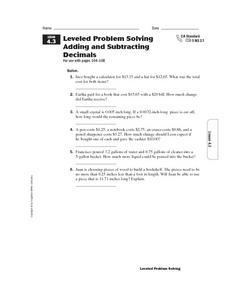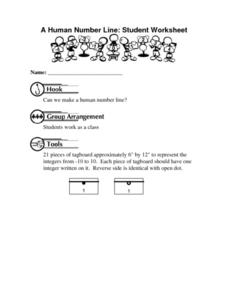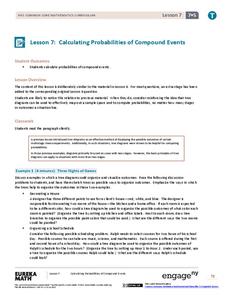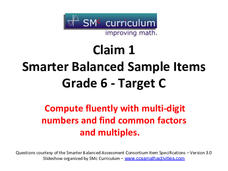Curated OER
Leveled Problem Solving Adding and Subtracting Decimals
In this adding and subtracting decimals practice worksheet, students sharpen their problem solving skills as they solve 6 story problems.
Curated OER
Add and Subtract Decimal Ten Thousandths (B)
In this decimals learning exercise, students solve 40 problems in which decimal numbers to the ten thousandth place are added or subtracted. Problems are in horizontal format and may need to be rewritten.
Curated OER
Adding Decimals
In this addition of decimals worksheet, students add up to 4 digit numbers together with decimals in them. Students complete 12 problems.
Curated OER
Adding And Subtracting Decimals
In this adding and subtracting decimals worksheet, students, with a partner, problem solve and calculate the answers to ten addition and subtraction equations or word problems.
Curated OER
Adding Decimals
In this decimal addition worksheet, students solve 20 problems that require them to add 2-digit decimal numbers to 2-digit decimal numbers.
Curated OER
Morning Math
It's never too early for math! Use these morning math problems to get learners reviewing past concepts and staying sharp on newer ones. The 16 warm-ups include skills such as counting by 10, adding in a word problem, decomposing numbers...
Curated OER
Domain: Operations and Algebraic Thinking
Practice basic operations for young mathematicians in fun ways! Using two decks of cards (Ace through 10 plus the joker), learners play "memory" by matching numbers that can be added to make 10 and writing number sentences. In another...
Curated OER
Number Base Clocks
Students investigate place value in base ten. In this number sense lesson plan, students participate in an online lesson plan at www.shodor.org/interactivate/activities/NumberBaseClocks and demonstrate how to convert numbers from base...
Curated OER
Addition Drill #3 (0-10)
In this math worksheet, 2nd graders solve 30 single-digit addition problems whose sums range from 0 to 10. Students notate their score, # correct and time.
DK Publishing
Addition Fact Families
Fact families are an excellent way to connect math operations for beginners to addition and subtraction. Use the examples here to review this concept before scholars try these on their own. For each, they examine two related number...
Curated OER
A Human Number Line: Student Worksheet
Kids are challenged to make a human number line. They line up, holding numbers from -10 to 10. They then add and subtract both positive and negative numbers, using themselves as the numbers on the number line. This is a great way to...
Math Mammoth
Add & Subtract Integers Fact Sheet
Guide young mathematicians through the crazy world of negative numbers with a handy reference document. Offering clear instructions for adding and subtracting positive and negative integers, this resource is a great way to...
EngageNY
Volume of Composite Solids
Take finding volume of 3-D figures to the next level. In the 22nd lesson of the series, learners find the volume of composite solids. The lesson the asks them to deconstruct the composites into familiar figures and use volume formulas.
Common Core Sheets
Comparing Fraction Relative Size
Which is the larger amount? Two-fourths of 10 dollars, or one-fourth of 100 dollars? This type of question is the main focus of a worksheet that has learners comparing fractions by their relative size. Each problem contains...
EngageNY
Relationships Between Quantities and Reasoning with Equations and Their Graphs
Graphing all kinds of situations in one and two variables is the focus of this detailed unit of daily lessons, teaching notes, and assessments. Learners start with piece-wise functions and work their way through setting up and solving...
EngageNY
Mid-Module Assessment Task: Grade 7 Mathematics Module 3
Lesson 16 in the series of 28 is a mid-module assessment. Learners simplify expressions, write and solve equations, and write and solve inequalities. Most questions begin as word problems adding a critical thinking component to the...
Illustrative Mathematics
But Mango Is My Favorite...
Opening up a package of fruit snacks is like a box of chocolates, you never know what you're going to get. When all the mango flavored ones are missing, learners calculate the probability that one bag versus the whole box is missing the...
EngageNY
Addition and Subtraction Formulas 2
Knowing the addition formulas allows for the calculations of double and half formulas. The fourth installment of 16 has the class use the addition formula to develop the double angle trigonometric formulas. Using the double formula,...
EngageNY
Chance Experiments with Outcomes That Are Not Equally Likely
The fifth portion of the 25-part series introduces probabilities calculated from outcomes that are not equally likely. Class members use tables to calculate probabilities of events, add outcome's probabilities, and find...
EngageNY
Calculating Probabilities of Compound Events
Use tree diagrams with multiple branches to calculate the probabilities of compound events. Pupils use tree diagrams to find the sample space for probability problems and use them to determine the probability of compound events in the...
Common Core Sheets
Declarative, Interrogative and Exclamatory Sentences
It's time to identify these sentences as interrogative, exclamatory, or declarative based on their ending punctuation.
CCSS Math Activities
Smarter Balanced Sample Items: 6th Grade Math – Target C
Are you looking for review questions before standardized testing? Grade 6 Claim 1 Item Slide Show offers nine questions covering a variety of topics using decimals, factors, and multiples. With separate slides for answers, using the...
Scholastic
Leads in Narrative Writing
The beginning, a very good place to start, is also a very difficult thing to craft. Provide your writers with this handout that identifies, and provides examples of, six different types of narrative leads.
Curated OER
Writing Equations: Addition and Subtraction 0 to 20
In these subtraction and addition worksheets, students write the equations for the addition and subtraction sentences. Students solve 28 problems.























